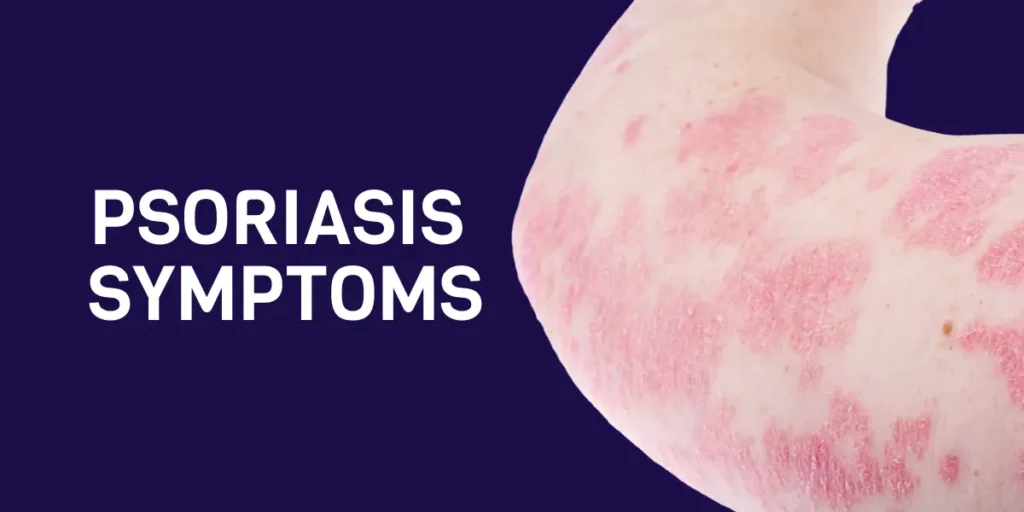Psoriasis Symptoms: Causes, Types, and Treatments

Share This Post
What Is Psoriasis?
Psoriasis is a chronic autoimmune condition that affects the skin, leading to the rapid buildup of cells on the surface. This results in red, itchy, and scaly patches that can be both uncomfortable and aesthetically challenging. Understanding what is psoriasis is crucial for those dealing with this condition.
Psoriasis Symptoms
The symptoms of psoriasis can vary widely among individuals, but common signs include:
- Red patches of skin
- Silver scales or plaques
- Dry and cracked skin
- Itching or burning sensation
These symptoms often appear on the elbows, knees, scalp, and lower back.
Psoriasis Types
There are several types of psoriasis characterized by different patterns and areas of involvement. In bullet points:
- Plaque psoriasis: Most common, characterized by raised, red patches covered with a silvery-white buildup of dead skin cells.
- Guttate psoriasis: Small, dot-like lesions.
- Inverse psoriasis: Smooth, red patches occurring in skin folds.
- Pustular psoriasis: White, pus-filled blisters surrounded by red skin.
- Erythrodermic psoriasis: Widespread redness, severe itching, and pain.
What Causes Psoriasis?
While the exact cause remains unclear, psoriasis is believed to be linked to the immune system. What causes psoriasis can be attributed to a combination of genetic and environmental factors triggering an abnormal immune response.
Psoriasis Risk Factors
In bullet points, here are some risk factors for psoriasis:
- Family history of psoriasis
- Stress
- Obesity
- Smoking
- Infections, particularly strep throat
- Certain medications
Understanding these factors is essential for managing and preventing flare-ups.
Psoriasis Diagnosis
Diagnosing psoriasis involves a thorough examination by a dermatologist. Skin biopsies and other tests may be conducted to confirm the condition and rule out other skin disorders.
Stages of Psoriasis
Psoriasis progresses through various stages:
- Mild psoriasis: Few patches, minimal discomfort.
- Moderate psoriasis: Increased redness and scaling.
- Severe psoriasis: Widespread, intense symptoms.
Psoriasis Treatment
In bullet points, here are treatment options for psoriasis:
- Topical treatments: Creams, ointments, and shampoos.
- Phototherapy: Exposure to ultraviolet light.
- Systemic medications: Oral or injected medications targeting the immune system.
Treatment plans are tailored based on the type and severity of psoriasis.
Psoriasis Health Disparities
Understanding psoriasis health disparities is crucial as certain populations may face challenges in accessing effective treatments. Disparities can arise due to socioeconomic factors, geographical location, or healthcare accessibility.
Psoriasis Complications
Left untreated, psoriasis can lead to complications such as psoriatic arthritis, cardiovascular issues, and mental health concerns. Understanding psoriasis complications is vital for comprehensive management.
Living With Psoriasis
Living with psoriasis involves adopting a holistic approach, including:
- Maintaining a healthy lifestyle
- Stress management
- Regular medical check-ups
Support groups and resources can provide invaluable assistance.
Psoriasis Triggers
Identifying and avoiding psoriasis triggers is crucial for minimizing flare-ups. Common triggers include stress, infections, and certain medications.
Psoriasis Prognosis
While there is no cure, advancements in treatments offer hope for managing symptoms effectively. The psoriasis prognosis varies, with many individuals leading fulfilling lives with proper management.
Takeaways
In conclusion, a comprehensive understanding of what is psoriasis and its various aspects is essential for individuals dealing with this condition. From recognizing symptoms to adopting effective treatment strategies, staying informed is key to managing psoriasis successfully.
